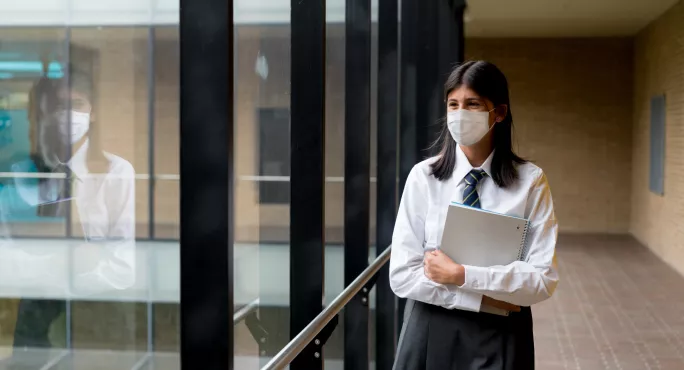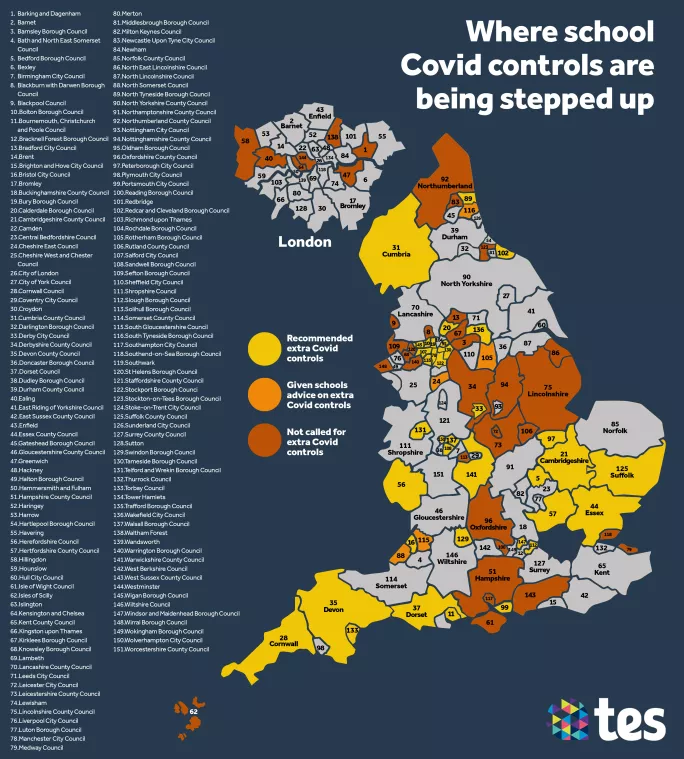Over 25% of areas ask schools to take extra Covid steps

Schools in at least a quarter of council areas in England have been advised to take extra steps to stop the spread of Covid, Tes can reveal.
At least 39 education authorities have made recommendations to schools in their areas to introduce extra Covid controls amid concerns about the spread of the virus.
The majority of these have called for schools to reintroduce the wearing of masks in communal areas.
More:
Background: Councils order masks in schools to stem Covid absence
Long read: Fears over school closures as cases of Covid soar
Coronavirus: More than 200,000 pupils off because of Covid
Other measures that councils have recommended include:
- calling on schools to halt whole school assemblies,
- reducing contact between year groups, and
- asking pupils to isolate in the event of a Covid case in their household until they have had a negative PCR test result.
All of this goes beyond the national guidelines given to schools at the start of term.
Schools in some areas have also been told to give more careful consideration to trips and residential visits.
Tes asked the 151 local education authorities in England whether they had issued blanket recommendations to schools across their cities, districts, boroughs and counties to introduce extra measures to combat the spread of Covid.
Of the 81 that responded, almost half - 39 - had issued district-wide recommendations to schools, another five issued advice on extra steps schools could take depending on their situation, while 37 said they had not issued any advice beyond the national guidance.
Extra measures have been called for by councils in all eight government regions of England outside of London.
Government ‘failing to grasp’ situation
Heads have welcomed the fact that Covid controls are being introduced in districts where local public health teams have decided this is necessary.
However, they also voiced concerns about the government’s response to the scale of the disruption now being experienced in schools.
Julie McCulloch, director of policy at the Association of School and College Leaders, said: “The government’s contingency framework includes a range of short-term measures that can be used on public health advice in reaction to coronavirus outbreaks in schools and colleges.
“With infection rates varying from setting to setting and region to region, this approach seems sensible on the face of it and allows a localised approach to be taken. However, the overall picture across the country is still one of extensive disruption to education and the government’s failure to grasp the size of the problem and provide an appropriate response is troubling.”
Leaders lack expert advice
The NAHT school leaders’ union has highlighted the challenges faced by schools managing the impact of the virus in areas where extra measures are not being recommended.
James Bowen, the union’s director of policy, said: “When local authorities do act we have learnt that it is crucial they communicate clear, unambiguous and direct recommendations to schools so that school leaders know precisely what they need to do and can share that information with staff, parents and pupils.
“We’re particularly concerned about those schools where they are experiencing high case numbers or outbreaks but are not in a [local authority] advising extra measures. In those cases, too often we’re hearing that school leaders are being left to make decisions largely for themselves, and are not always receiving the expert advice they need.”
Headteachers’ perspective: Disruption was ‘inevitable’
A headteacher of a secondary school in an area without additional Covid measures in place told Tes it had felt “inevitable” that an outbreak would hit the school this term.
“We have had 10 per cent of pupils and close to 10 per cent of staff [off school with Covid] and it has been very difficult indeed. I have never seen a staff cover sheet like it.
“It felt inevitable because there have been almost no mitigations in place. We waited and waited to see whether new guidance would be brought in at the start of term because cases were going up.
“We took the decision to take extra steps so that staff who wanted to do can wear masks and can still socially distance both when teaching and from colleagues.”
The head, who has been out of school with Covid, added: “I think the most surprising aspect of having been through an outbreak is that so much is left to headteachers to decide when public health is outside of our area of expertise.
“It was great at the start of the term to see pupils of all ages back together on the quad and to have assemblies and we couldn’t have carried on as were last year indefinitely. However, we are not out of the pandemic and we need to find a way of operating in the stage we are now in.”
Areas taking extra steps (grey = no data from LA)

The authorities asking schools to take extra measures include all 10 councils in the Greater Manchester area, which have strongly recommended that face coverings are worn by staff, visitors and pupils in Year 7 and above from the start of this month.
In Essex, the county council has advised parents of primary-aged pupils to test them twice a week.
Mike Gogarty, Essex County Council’s director of Public Health, said that regular testing of pupils should go ahead provided it does not cause them distress.
Dr Gogarty said: “We cannot underestimate the rapidly increasing rate of Covid-19 infections we are seeing in Essex primary schools at present and what this will inevitably mean for schools and pupils over the coming weeks.”
Telford & Wrekin Council said it had advised schools to reintroduce face coverings as well as staggered lunchtimes and virtual parents evenings where possible.
Ealing Council has not introduced council-wide recommendations but told Tes that there were 22 schools in the area where additional measures had been recommended including limiting educational visits and the temporary reintroduction of bubbles and face coverings.
Covid ‘havoc’ in schools
The news comes as headteachers warned that Covid-related absence is causing “havoc” in schools.
The latest school attendance statistics released by the Department for Education showed an increase in pupil and teacher absences due to Covid in the week before half term.
ASCL general secretary Geoff Barton said that the increase in absence was an “impossible situation” for many schools because they have to “juggle online and in-person learning for different groups of pupils at different times with fewer staff”.
Ms McCulloch urged the government to do more to control the spread of the virus in schools.
She added: “The vaccination programme for 12- to 15-year-olds has been beset by delays and it seems obvious that the government has vastly overestimated the capacity of the School Aged Immunisation Service to undertake such a monumental task. Schools and colleges were originally promised this would be completed by the October half term but, more than a fortnight later, progress is still sluggish.
“Meanwhile the rollout of CO2 monitors to education settings has been painfully slow and the government’s advice should these indicate poor ventilation issues remains to open doors and windows. As well as the obvious difficulties this presents in managing comfortable working temperatures for students and staff, leaders have the added headache of rapidly rising energy costs to contend with.
“The government needs to step up to the plate and address the significant disruption to children and young people’s learning once and for all with significantly more funding for education recovery than it has already announced, money for high-quality ventilation systems and, above all, better resources to get the vaccination programme completed.”
A DfE spokesperson said: “The protective measures in place in schools strike a balance between managing transmission risk - with enhanced ventilation, regular Covid testing and vaccinations of older students and staff - and reducing disruption to education by removing the need for close contacts in bubbles to self-isolate and for face coverings to be worn in most cases.
“If there are particularly high Covid case rates in schools or colleges in their local area, local directors of public health may advise they reintroduce temporary additional measures such as increased testing, but face-to-face education should be prioritised.”
You need a Tes subscription to read this article
Subscribe now to read this article and get other subscriber-only content:
- Unlimited access to all Tes magazine content
- Exclusive subscriber-only stories
- Award-winning email newsletters
Already a subscriber? Log in
You need a subscription to read this article
Subscribe now to read this article and get other subscriber-only content, including:
- Unlimited access to all Tes magazine content
- Exclusive subscriber-only stories
- Award-winning email newsletters



